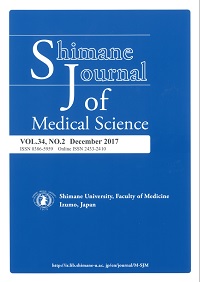Shimane University Faculty of Medicine
ISSN :0386-5959(冊子体)
ISSN :2433-2410(オンライン)


これらの論文は クリエイティブ・コモンズ 表示 - 非営利 - 改変禁止 4.0 国際 ライセンスの下に提供されています。
ダウンロード数 : ? 件
この文献の参照には次のURLをご利用ください : https://ir.lib.shimane-u.ac.jp/28532
Shimane Journal of Medical Science 29 2
2013-02-01 発行
Oral Administration of Fexofenadine Hydrochloride can Attenuate Nasal Symptoms and Restore the Impaired Cognitive Function in School-Age Patients with Japanese Cedar Pollinosis
ファイル
内容記述(抄録等)
We conducted a well-controlled observational study attempting to examine whether decreased cognitive functions caused by Japanese cedar pollinosis could be improved by oral administration of fexofenadine hydrochloride particularly in school-age patients. Cognitive functions were evaluated before and after the treatment by employing Trail Making tests (TMT). Participating patients answered a questionnaire about treatment effects and their satisfaction with fexofenadine hydrochloride. A total of 54 patients aged 7 to 16 were enrolled in this study. A significant improvement was observed with two kinds of TMT (P<0.0001 for both). The overall ratio of positive answers to the question of overall satisfaction with the drug, concentration in the classroom, symptoms, inconvenience in daily life, and night-time sleep were 88.5%, 71.1%, 88.7%, 60.0%, and 65.3%, respectively. These results taken together suggest that treatment with fexofenadine hydrochloride actually restores nasal symptom-derived decreases in cognitive functions, with no impairment of cognitive functions by the central nervous system (CNS) depressant actions.
About This Article
Other Article
PP. 71 - 78
